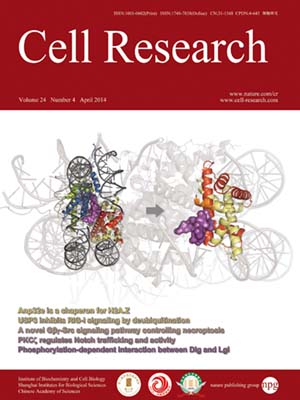
Volume 24, No 4, Apr 2014
ISSN: 1001-0602
EISSN: 1748-7838 2018
impact factor 17.848*
(Clarivate Analytics, 2019)
Volume 24 Issue 4, April 2014: 400-416
ORIGINAL ARTICLES
USP3 inhibits type I interferon signaling by deubiquitinating RIG-I-like receptors
Jun Cui1,2,*, Yanxia Song2,3,*, Yinyin Li2,4,*, Qingyuan Zhu2, Peng Tan2,4, Yunfei Qin1, Helen Y Wang2 and Rong-Fu Wang2
1Key Laboratory of Gene Engineering of the Ministry of Education, State Key Laboratory of Biocontrol, College of Life Sciences, Sun Yat-sen University, Guangzhou 510275, China
2Center for Inflammation and Epigenetics, The Methodist Hospital Research Institute, Houston, TX 77030, USA
3Central Laboratory, The First Affiliated Hospital, Jilin University, Changchun 130012, China
4Institute of Biosciences and Technology, Texas A&M University Health Science Center, Houston, TX 77030, USA
Correspondence: Jun Cui, E-mail: cuij5@mail.sysu.edu.cn; Rong-Fu Wang, E-mail:(rwang3@tmhs.org)
Lysine 63 (K63)-linked ubiquitination of RIG-I plays a critical role in the activation of type I interferon pathway, yet the molecular mechanism responsible for its deubiquitination is still poorly understood. Here we report that the deubiquitination enzyme ubiquitin-specific protease 3 (USP3) negatively regulates the activation of type I interferon signaling by targeting RIG-I. Knockdown of USP3 specifically enhanced K63-linked ubiquitination of RIG-I, upregulated the phosphorylation of IRF3 and augmented the production of type I interferon cytokines and antiviral immunity. We further show that there is no interaction between USP3 and RIG-I-like receptors (RLRs) in unstimulated or uninfected cells, but upon viral infection or ligand stimulation, USP3 binds to the caspase activation recruitment domain of RLRs and then cleaves polyubiquitin chains through cooperation of its zinc-finger Ub-binding domain and USP catalytic domains. Mutation analysis reveals that binding of USP3 to polyubiquitin chains on RIG-I is a prerequisite step for its cleavage of polyubiquitin chains. Our findings identify a previously unrecognized role of USP3 in RIG-I activation and provide insights into the mechanisms by which USP3 inhibits RIG-I signaling and antiviral immunity.
10.1038/cr.2013.170
FULL TEXT | PDF
Browse 2562


